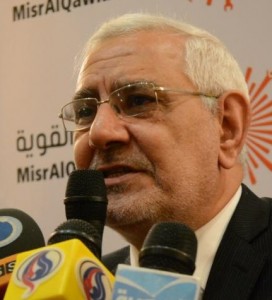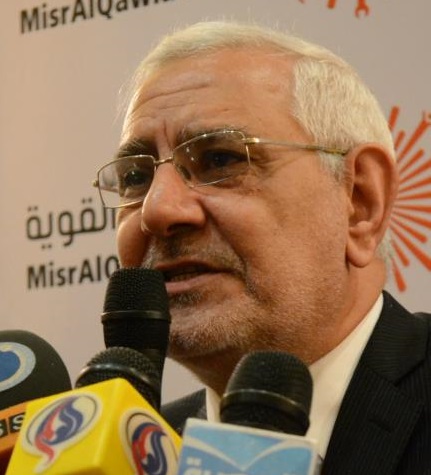
The Misr Al-Qawia Party, the National Coalition to Support Legitimacy (NCSL) and the Press Syndicate have criticised draft amendments to the 2012 constitution proposed by the legal experts’ committee.
The legal experts committee, consisting of 10 legal and constitutional experts, submitted an amended draft of the 2012 constitution, to be further amended by the constituent assembly, comprised of 50 members.
Misr Al-Qawia announced in a statement released on Monday it will not take part in the constituent assembly. The party stated that “drafting constitutions needs a stable political and social environment to allow a minimum degree of consensus.”
The party stated that the only solution to easing the level of polarisation taking over the political scene would be to announce that this constitution will only be valid for five years.
The party criticised the legal experts’ committee for drafting the constitution amid what it described as “absence of transparency”.
Misr Al-Qawia condemned the criteria for appointing the 50 members constituent assembly. It said the criteria of this assembly moved from the extreme measure of having the assembly mainly comprise of political representatives (practiced in the appointment of the constituent assembly which drafted the 2012 constitution) to having too little political representatives (where representatives of political parties take only six of the assembly’s 50 seats).
“We are repeating the mistakes made during the drafting process of the 2012 constitution,” the statement read.
The NCSL, comprised of political movements calling for the reinstatement of ousted President Mohamed Morsi, also criticised the constitutional amendments drafted by the legal experts’ committee.
The coalition released a statement on Tuesday where it said the amendments “secure the return of the ousted Hosni Mubarak regime which Egypt’s people have revolted against.”
The coalition said the amendments put the armed forces above the law and the constitution by giving the Supreme Council of the Armed Forces (SCAF) the exclusive right to appoint the defence minister. It added that the amendments eradicate the idea of judicial independence by making the appointment of the prosecutor general a responsibility of the president.
The NCSL said the amendments “challenge” the religious nature of Egyptians. It specifically criticised the cancellation of article 219, which detailed the sources of the principles of Islamic Sharia to be consulted when applying the constitution. The coalition alleged cancelling article 219 would “open the door for atypical religions”.
“This is a war on the Egyptian state’s identity which the January revolutionaries wanted to transform into a modern democratic state, built upon the bases of justice and equality,” the statement read.
The Press Syndicate held a press conference on Monday where it condemned the legal experts’ committee for failing to abide by the syndicate’s proposed amendments to constitutional articles which govern the press and the media.
The syndicate proposed cancelling the articles which allow the confiscation or closing down of newspapers. It also proposed replacing the punishment of any cases related to publishing from imprisonment to paying a fine.
The syndicate accused the committee of ignoring its amendments to articles which would confirm journalist’s right to access information. The syndicate had also requested the formation of a Press Council and a separate Media Council to ensure the press and the media’s independence, another proposal which was disregarded.
The syndicate called on the constituent assembly to consider its amendments instead. The syndicate’s head, Diaa Rashwan, is the syndicate’s representative within the constituent assembly.
Meanwhile, the 30 June Front, founded by the Tamarod rebellion campaign, submitted to the president a list of personalities it nominated for membership in the constituent assembly.
The list, co-drafted by the youth of the National Salvation Front (NSF), and the Tamarod campaign, nominated Tamarod founders Mohamed Abdel Aziz and Mahmoud Badr. In a statement, the front explained that one of the aforementioned should act as representative for Tamarod, and the other to represent the public figures appointed by the cabinet.
The list also nominated Hossam Mo’ness, spokesman of Al-Tayar Al-Sha’aby (Popular Current) as representative for the 25 January Revolution youth.
The presidency put forward the criteria for the selection of the constituent assembly members on 8 August. The criteria included: three Al-Azhar representatives, three representatives from the Coptic Orthodox Church, four youth figures (including a member of Tamarod), and six representatives from political parties. The culture sector will be represented by four members, the labour sector by two members, professional syndicates by four representatives and farmers by two members. National councils would be represented by five members, and unions and federations by five members. The armed forces and the police will each choose one person to represent them, alongside 10 public figures nominated by the cabinet.

